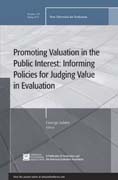
Promoting value in the public interest: informing policies for judging value in evaluation
Julnes, George
Do you make evidence-based decisions when designing and conducting evaluations, and use methods validated by experience? Because of the growing importance of evidence-based decision-making for improving programs and policies, this issue examines methods selection:Which is better?How can one be improved?Are theresults of the project worth the resources expended?and how that leads to confidence in value-based conclusions. It presents a constructive dialogue on valuing in evaluation, with the goal of developing a pragmatic approach for guiding method choice and for promoting methodology policies that support multiple approaches to valuation being employed in context-appropriate ways so as to serve the public interest.This is the 133rd volume of the Jossey-Bass quarterly report series New Directions for Evaluation, an official publication of the American Evaluation Association. INDICE: EDITOR'S NOTES 1George Julnes1. Managing Valuation 3George JulnesThis chapter introduces challenges in valuing, identifies variations in currentpractice, and lays the groundwork for managing the use of context-appropriatevaluing methodologies.2. The Logic of Valuing 17Michael ScrivenThe author distinguishes between the logic of valuing and the logic of evaluation, and explicates the details of the logic of valuing.3. The Evaluator's Role in Valuing: Who and With Whom 29Marvin C. Alkin, Anne T. Vo, Christina A. ChristieThe authors consider the multiple theoretic perspectives that govern an evaluator's behavior and present a typology of evaluator valuing roles.4. Step Arounds for Common Pitfalls When Valuing Resources Used Versus Resources Produced 43Brian T. YatesThis chapter describes how the value of a program can be understood notonly as outcomes, but also how those outcomes compare to the types and amounts of resources expended to produce the outcomes.5. The Role of Context in Valuing Federal Programs 53Stephanie ShipmanThe author draws upon her experience at the U.S. Government Accountability Office (GAO), and provides insight into issues involved in deciding how to evaluate a federal program or policy.6. WhenOne Must Go: The Canadian Experience With Strategic Review and Judging Program Value 65FranÇois DumaineThis chapter reviews the Canadian experiment with assessing the worth of public programs and policies and using the resulting value judgments to drive funding decisions.7. Valuing, Evaluation Methods, and thePoliticization of the Evaluation Process 77Eleanor ChelimskyThe author develops the idea that what we are talking about when we talk about valuing is methodology.8. Valuation and the American Evaluation Association: Helping 100 Flowers Bloom, or at Least Be Understood? 85Michael MorrisThis chapter uses the American Evaluation Association as an example, explores challenges encountered when organizations tackle publicsector valuation, and offers tentative recommendations for addressing those challenges.9. Evaluators in a World of Valuators 91George F. GrobThe author describes the work of evaluators in policy and program contexts in which everyone must make value judgments.10. Contextual Pragmatics of Valuing 97Michael Quinn PattonThis chapter highlights how the issue authors emphasize contextual sensitivity and adaptability in the valuing process.11. Developing Policies to Support Valuing in the Public Interest 109George JulnesThis chapter develops a pragmatic framework that organizes multiple paradigms of valuing with implications for policies for guiding contextappropriate method choice for valuing in the public interest.INDEX 131
- ISBN: 978-1-118-30841-7
- Editorial: John Wiley & Sons
- Encuadernacion: Rústica
- Páginas: 144
- Fecha Publicación: 30/04/2012
- Nº Volúmenes: 1
- Idioma: Inglés
